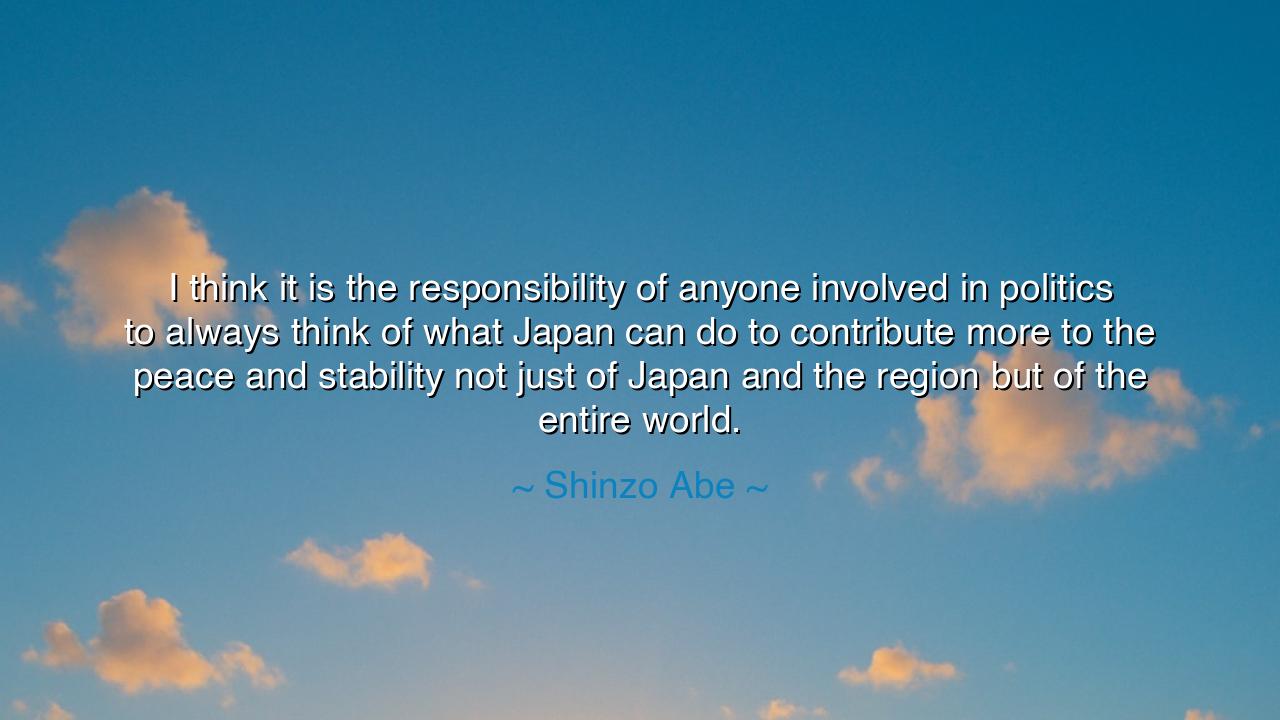
I think it is the responsibility of anyone involved in politics
I think it is the responsibility of anyone involved in politics to always think of what Japan can do to contribute more to the peace and stability not just of Japan and the region but of the entire world.






In the words of Shinzo Abe, "I think it is the responsibility of anyone involved in politics to always think of what Japan can do to contribute more to the peace and stability not just of Japan and the region but of the entire world." These words speak with profound insight about the moral responsibility of leaders, not just to their nation, but to the global community. Abe’s vision transcends national borders, urging those in positions of power to view their actions through a broader lens, considering the impact of their decisions not only on their own people but on humanity as a whole. His statement speaks to the principle of shared responsibility, reminding us that true leadership is not about self-interest or isolation, but about contributing to the greater good, about working for peace and stability on a global scale.
In the ancient world, this idea was also central to the thoughts of philosophers like Socrates and Plato. For Socrates, the good life was not merely about individual prosperity, but about contributing to the well-being of society. His famous dialogues often centered around the responsibility of citizens to think beyond their personal desires and act in ways that contributed to the moral health of the state. Similarly, Plato in The Republic suggested that the best rulers were not those who sought power for themselves but those who recognized that true leadership meant working for the peace and justice of the whole community, a community that included not just those in the immediate vicinity but the greater world. Just as these ancient thinkers believed that the responsibility of leadership was to the common good, Abe echoes this in his vision for Japan—a nation whose influence should extend beyond its own borders to promote global peace.
Consider the example of Emperor Meiji, who, during the Meiji Restoration, transformed Japan from a feudal society into a modern, industrialized nation. His reforms were not solely for the prosperity of Japan but were guided by the recognition that Japan could only achieve stability in a changing world if it played a role in global affairs. Under his leadership, Japan opened its doors to the world, sought to modernize, and in doing so, contributed to the balance of power in the Pacific. The Meiji Restoration stands as a testament to the idea that true leadership requires thinking beyond one’s own borders, and that a nation can flourish when it considers how its actions will impact the broader world.
In modern times, Shinzo Abe himself sought to enhance Japan’s role on the global stage. His vision for Japan’s contribution to global peace was not just a political stance but a moral one. During his tenure, Abe worked to strengthen Japan’s alliances—particularly with the United States—and advocated for a more active role in international peacekeeping efforts. His vision was clear: Japan, as a nation with a rich history and a deep commitment to peace, had a responsibility to contribute not just to its own security but to the security of the world. Abe’s call to action was not about Japan seeking to dominate or control, but about working with others to maintain peace and ensure that global stability remained intact in an increasingly complex world. His leadership, which sought to balance national pride with international responsibility, reflects the ancient understanding that a nation’s strength is best measured by the contributions it makes to the greater good.
This idea of global responsibility is also deeply embedded in the teachings of Cicero, the Roman philosopher and statesman. Cicero believed that peace and justice were universal values, not confined to a single city-state or empire. He argued that every leader, whether in the Roman Senate or in the household, had an obligation to contribute to the welfare of society—not just their immediate family or community, but humanity at large. Just as Cicero understood that the peace and prosperity of Rome depended on its relationship with the wider world, Abe’s vision calls for Japan’s contribution to a more peaceful, stable world, where each nation recognizes its role in maintaining the common good.
The lesson embedded in Shinzo Abe’s words is timeless: true leadership is not about seeking power for oneself or one’s nation, but about recognizing the shared responsibility we all have for the peace and stability of the world. As leaders, whether in the political, economic, or personal spheres, we must think beyond our own interests and ask ourselves how we can contribute to the greater good. Whether through diplomacy, innovation, or compassion, every action we take has the potential to contribute to a more peaceful world.
In practical terms, we can begin to implement this lesson by expanding our horizons and considering how our decisions affect not only our immediate surroundings but the larger community. This could mean advocating for justice and peace in our communities, supporting initiatives that promote global cooperation, or simply listening to the voices of those whose perspectives extend beyond our own. Just as Abe’s vision for Japan called for a larger role in the world, we too must acknowledge our responsibility to contribute to the peace and prosperity of those around us. In this way, we align ourselves with the great leaders of history who understood that the health of the world depends on our shared efforts to create a just and peaceful future.






AAdministratorAdministrator
Welcome, honored guests. Please leave a comment, we will respond soon